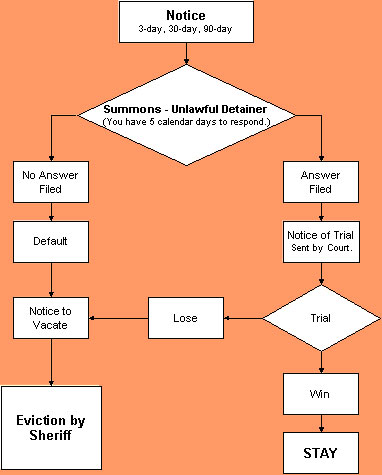Ventura County Eviction Lawyers (Unlawful Detainer Actions)
Landlords: Do you have tenants who are not paying rent? Are your tenants selling illegal substances, or doing other illegal activities? Are your tenants violating the lease’s pet policy?
Tenants: Is your landlord trying to evict you? Has your landlord tenant relationship deteriorated into an eviction notice? Would you like to know your tenant rights?
If you answered “yes” to any of these questions, you need to speak to one our tenant attorneys before the problem escalates. Unrepresented landlords and tenants may find the eviction process difficult to understand and may not know what is necessary to win.

TENANTS: You Need to Act Fast
An unlawful detainer lawsuit is a “summary” court procedure. This means that the court action moves forward very quickly, and that the time given the tenant to respond during the lawsuit is very short. For example, in most cases, the tenant has only five days to file a written response to the lawsuit after being served with a copy of the landlord’s summons and complaint. Code of Civil Procedure § 1167.3.
The landlord must follow certain procedures consistent with CA tenants’ rights, such as providing a 3, 30, 60 or 90-day notice to the tenant outlining the reasons for the eviction notice.
In an unlawful detainer lawsuit, the court holds a hearing at which the parties can present their evidence and explain their case. If the court finds that the tenant has a good defense, the court will not evict the tenant. If the court decides in favor of the tenant, the tenant will not have to move, and the landlord may be ordered to pay court costs (for example, the tenant’s filing fees). The landlord also may have to pay the tenant’s attorney’s fees, if the rental agreement contains an attorney’s fee clause and if the tenant was represented by an attorney. Civil Code § 1717; Trope v. Katz (1995) 11 Cal.4th 274. This is what the process looks like:

Defenses May Include:
- Procedural or Technical Defects in the Notice or Petition
- Breach of Warranty of Habitability
- Retaliatory Evictions
- The law assumes that the landlord has a retaliatory motive if the landlord seeks to evict the tenant(s) within six months after the tenant(s) has exercised certain rights, including starting a lawsuit based on the condition of the unit and/or complaining about the condition of the rental unit to the landlord. See Civil Code Section 1942.5.
- Violations of California’s Toxic Mold Protection Act of 2001 (TMPA), (See California Health and Safety Code §§ 16147 & 26130).
- Unlawful, Unfair or Fraudulent Business Practices Under Business and Professions Code § 17200
After the Court’s Decision
If the court decides in favor of the tenant, the tenant will not have to move, and the landlord may be ordered to pay the tenant’s court costs (for example, filing fees) and the tenant’s attorney’s fees. However, the tenant will have to pay any rent that the court orders.
If the landlord wins, the tenant will have to move. In addition, the court may order the tenant to pay the landlord’s court costs and attorney’s fees, and any proven damages, such as overdue rent or the cost of repairs if the tenant damaged the premises.
It is possible, but rare, for a losing tenant to convince the court to allow the tenant to remain in the rental unit. This is called relief from forfeiture of the tenancy. The tenant must convince the court of two things in order to obtain relief from forfeiture: that the eviction would cause the tenant severe hardship, and that the tenant is able to pay all of the rent that is due or that the tenant will fully comply with the lease or rental agreement. See Code of Civil Procedure § 1179.
A tenant can obtain relief from forfeiture of a lease or a rental agreement, even if the tenancy has terminated (ended), so long as possession of the unit has not been turned over to the landlord. A tenant seeking relief from forfeiture (or the tenant’s attorney) must apply for relief at any time prior to restoration of the premises to the landlord, but such a petition should be made as soon as possible after the court issues its judgment in the unlawful detainer lawsuit
Know Your Rights:
If the landlord uses unlawful methods to evict a tenant, the landlord may be subject to liability for the tenant’s damages, as well as penalties of up to $100 per day for the time that the landlord used the unlawful methods. Civil Code § 789.3.
Give us a call today for a free consultation (805) 482-1170